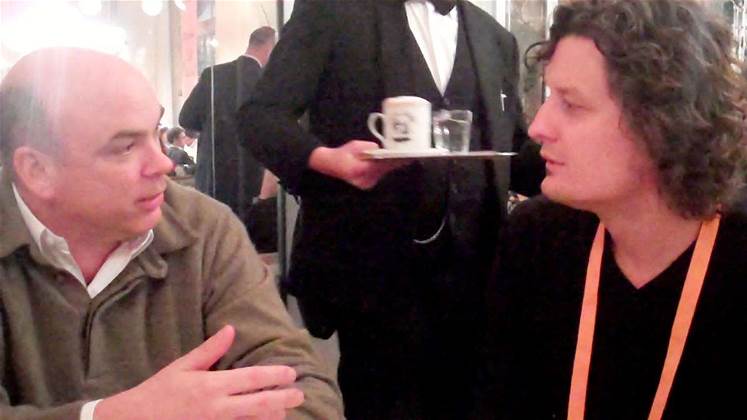Dr Mike Lynch recently sold his software company Autonomy to HP for US$11 billion.

iTnews editor Brett Winterford caught up with Dr Lynch at a traditional Viennese coffeehouse to get a high level view of what the software does.
Whilst the cake was superb, the coffeehouse proved a challenging environment to capture the sound, so we’ve transcribed the interview below.
iTnews: A lot of readers back at home may not be familiar with Autonomy, if you could put it in a nutshell, what does the software do?
Dr Mike Lynch: There is a lot of information in the world that’s not in a form that computers are used to like databases, things like email, social media, audio and video. Autonomy technology allows computers to understand what that means, so it can listen to a phone call and understand it, watch a TV show and understand what its about, read an email and understand what its about.
iTnews: We think about tag words as a way for machines to make sense of information, what’s the secret sauce for it to understand human information?
Dr Mike Lynch: That’s how people tried to do it before, but tagging stuff doesn’t really work. The technology is based on something called Bayesian inference, all very mathematical and very clever. Actually, Bayes lived in around 1750, 250 years later the rest of us have understood he discovered something amazing, and [are] re-writing research in these areas and getting computers to understand [human information].
iTnews: How might someone in financial services, for example, use this software?
Dr Mike Lynch: Well, imagine anywhere where you need a computer to understand a piece of information. Take someone like Bank of America for example. You’ve got all the stuff that goes around regulatory and risk, so [the software] reads all the content and works out what needs to be archived. It reads all the email so if someone sends an email that’s going to get the bank in trouble, the computer reads that and stops the email going out. It sends an email back and says, you might want to re-write this one. So you’ve got that side of it, the legal and regulatory point of view, then you’ve got things like enterprise search, where you can find [information] within the bank, process forms etc. And the last one, a lot of financial services now don’t meet their customers over the counter. What the software does is manage web site and content management, call centres, getting certain answers to people…
iTnews: What about a telco, how would a telco use it?
Dr Mike Lynch: Well, anything to do with content. For example, if they’ve got a lot of online video content and they want to make it searchable, and of course augmented reality which is a big thing in the telco world – when you hold up your smartphone to something and it recognises what it is, you can bring it to life, you can order stuff… were seeing a lot of the telcos now prepare for that next wave of content.
iTnews: Remind me when the company was acquired by HP?
Dr Mike Lynch: It was announced in August and closed in October.
iTnews: How much did they buy it for?
Dr Mike Lynch: About $11 billion dollars.
iTnews: Oracle made it clear the company was on the market for a while…
Dr Mike Lynch: No, it wasn’t. Oracle said there had been a meeting and a PowerPoint was presented. Actually it turns out that PowerPoint had nothing to do with that meeting, it was from a meeting six months earlier with someone completely different.
iTnews: If they had Autonomy…
Dr Mike Lynch: We’ve offered to sort that that problem for them, so they don’t get their data mixed up next time.
iTnews: Either way, if this software can change the way we deal with information, why does it make sense for Autonomy to be part of a larger beast like HP?
Dr Mike Lynch: What HP realised is that up until now, the technology had been based on machines forcing us to fit to them – rows and columns, ones and zeros, databases. HP realised there was an explosion in social media, audio and video and text. Actually, the vast majority of information is not in a machine format. HP realised they needed the key technology for that.
Database has been the technology for the forty years, this technology is for the next forty years.
Brett Winterford travelled to HP Discover as a guest of HP.


_(28).jpg&h=140&w=231&c=1&s=0)

_(23).jpg&h=140&w=231&c=1&s=0)






 iTnews Benchmark Awards 2026
iTnews Benchmark Awards 2026
 iTnews Executive Retreat - Security Leaders Edition
iTnews Executive Retreat - Security Leaders Edition
 iTnews Cloud Covered Breakfast Summit
iTnews Cloud Covered Breakfast Summit
 The 2026 iAwards
The 2026 iAwards












_(1).jpg&h=140&w=231&c=1&s=0)



